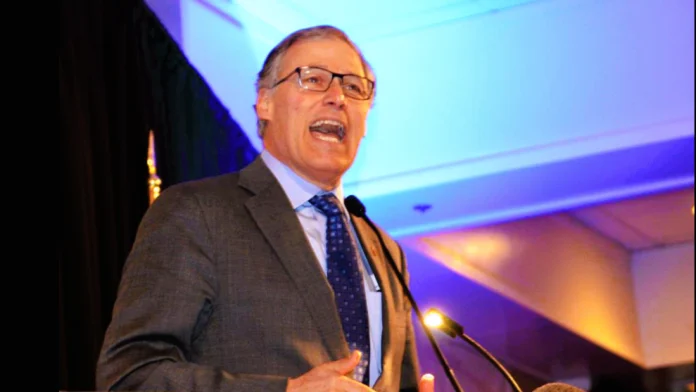Washington state employees plan to walk off the job at noon on Sept. 10 to protest the compensation offers from Gov. Jay Inslee in the current contract talks. According to KOMO News: “WFSE negotiators said they want to express their frustration with where the labor talks have gone. They called the wage offer proposed by the state … ‘disrespectful’ and are demanding livable pay rates.”
What exactly are these “disrespectful” wage proposals? We don’t know. Nor do the state employees being goaded into a walkout by their union leadership.
Since 2004, state negotiations with union executives about how much taxpayers compensate government employees have been secret, even though these talks with the governor’s office involve hundreds of millions of dollars in public spending per biennium. Before 2004, compensation decisions were made transparently with public hearings. They were part of the normal legislative budget process. That’s as it should be.
In a video, WFSE leaders tell public employees that they can’t share details of current pay talks until a tentative agreement has been reached, implying that they are being forbidden from doing so. Ashley Fueston, council vice president, said, “The way that our bargaining structure works here in the state of Washington, we aren’t allowed to share the details of what’s happening within bargaining.”
What Fueston doesn’t say is that secrecy is something union leadership wants and has fought to maintain. For example, Section 39.13 of the WFSE 2023-25 contract says: “Bargaining sessions will be closed to the press and the public unless agreed otherwise by the chief spokespersons. No proposals will be placed on the parties’ web sites…. There will be no public disclosure or public discussion of the issues being negotiated until resolution or impasse is reached on all issues submitted for negotiations.”
Keeping taxpayers and public employees in the dark allows union leadership to get away with saying things like a compensation offer is “disrespectful” without actually providing any details.
Is the governor currently offering raises of 1%, 3%, or more? How much more are union executives countering with and asking taxpayers to provide?
These are basic financial details that should be publicly available, especially if 50,000 state workers are being told to walk off the job.
Government employee contract negotiations should be fully open to the public. At a minimum, all contract proposals and documents to be discussed should be made publicly available before and after the contact meetings, with fiscal analysis showing the potential costs. This would better inform the public and state employees about promises and tradeoffs being proposed so all sides could decide if the offers are in fact “disrespectful” or instead reflect fiscal realities.
This type of transparency also makes clear whether one side or the other is being unreasonable in its demands, and quickly reveals whether anyone is acting in bad faith.
While we wait for these common-sense transparency reforms to be adopted, Citizen Action Defense Fund (CADF), Washington Policy Center (WPC), and Mountain States Policy Center (MSPC) are working together on litigation to provide much-needed transparency after the contracts are agreed to.
In March 2023, CADF won its public records lawsuit against the governor’s Office of Financial Management (OFM) to force the release of initial offers in collective bargaining negotiations after the parties had signed agreements. The governor’s OFM filed an appeal at the Division II Court of Appeals, however, and the appellate court overturned the trial court’s decision. This ruling conflicts with other public records cases of other appellate courts – including the state supreme court.
CADF has since appealed this public records case with the state’s highest court and WPC and MSPC are joining together on an amicus to help ensure that going forward, the public has access to all the details concerning taxpayer-funded government compensation agreements. While we wait for a decision from the state supreme court on the current public records dispute, we know that what is “disrespectful” is the anti-transparent demand for secrecy that keeps taxpayers and state workers from knowing what compensation offers are actually on the table.
Before calling on 50,000 public servants to walk off the job, providing basic transparency about the taxpayer-funded compensation offers should be step one.
Elizabeth New is director of the Center for Worker Rights at Washington Policy Center. Jackson Maynard is the Executive Director at Citizen Action Defense Fund. Jason Mercier is Vice President and Director of Research at Mountain States Policy Center.




